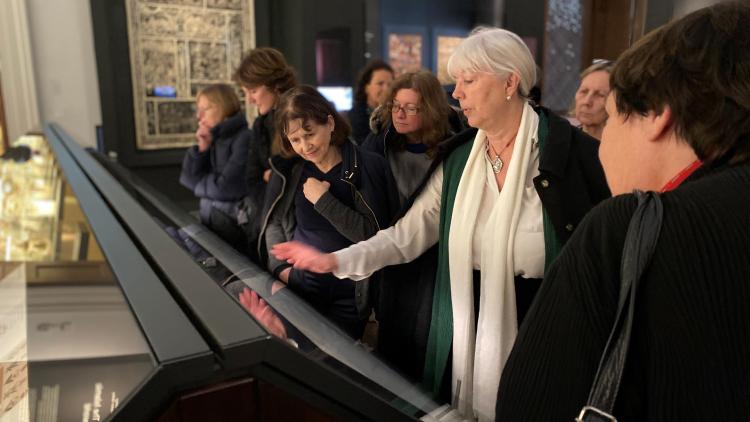MA Korean Studies and Intensive Language


Key information
- Duration
- Two-year (full-time) or four-year (part-time)
- Start of programme
- September
- Attendance mode
- Full-time or part-time
- Location
- Russell Square, College Buildings
- Fees
-
Home student fees: £12,220 per year
Overseas student fees: £25,320 per yearPlease note that fees go up each year.
See postgraduate fees for further details. - Course code
- MAKORAND
- Entry requirements
-
We will consider all applications with 2:2 (or international equivalent) or higher. In addition to degree classification we take into account other elements of the application such as supporting statement. References are optional, but can help build a stronger application if you fall below the 2:2 requirement or have non-traditional qualifications.
-
Afghanistan: Qualifications (Bachelor equivalency): Master's degree
Equivalent to 2:ii: 80% or 3.3/4.0
-
Argentina: Qualifications (Bachelor equivalency): Titulo / Grado de Licenciado
Equivalent to 2:ii: 7/10
-
Australia: Qualifications (Bachelor equivalency): Bachelor degree
Equivalent to 2:ii: 2:2 or Credit or 65%
-
Austria: Qualifications (Bachelor equivalency): Bachelor degree
Equivalent to 2:ii: 2.5/5.0 and overall Pass (Bestanden)
-
Bahrain: Qualifications (Bachelor equivalency): Bachelor degree
Equivalent to 2:ii: 75% or GPA 3.0/4.0
-
Bangladesh: Qualifications (Bachelor equivalency): Bachelor’s from Bangladesh University of Engineering and Technology or Master's degree
Equivalent to 2:ii: 60% or GPA 3.0/4.0
-
Belgium: Qualifications (Bachelor equivalency): Licentiaat or Licencié
Equivalent to 2:ii: 13/20 or 65%
-
Botswana: Qualifications (Bachelor equivalency): Bachelor degree (5-year) or Master's from University of Botswana
Equivalent to 2:ii: GPA 3.5/5.0 or 65% or B- or Good
-
Brazil: Qualifications (Bachelor equivalency): Título de Bacharel / Título de Licenciado (4-year)
Equivalent to 2:ii: 7/10 or 70%
-
Brunei: Qualifications (Bachelor equivalency): Bachelor degree
Equivalent to 2:ii: Lower Second Class Honours with 50% overall
-
Bulgaria: Qualifications (Bachelor equivalency): Bachelor degree
Equivalent to 2:ii: 4.3/6
-
Cameroon: Qualifications (Bachelor equivalency): Diplôme d'Ingénieur/ Diplôme d'Études Supérieures de Commerce (5-year)
Equivalent to 2:ii: 12-13 assez bien (fair); 70-74; or B+
-
Canada: Qualifications (Bachelor equivalency): Bachelor degree
Equivalent to 2:ii: GPA 3.0/4.0 or 74-77% or overall B
-
China Qualifications (Bachelor equivalency): Bachelor degree (4-year)
Equivalent to 2:ii:
73% or 2.6/4.0 (C9 unis)
75% or 2.8/4.0 (Double First unis)
80% or 3.25/4.0 (all other unis) -
Colombia: Qualifications (Bachelor equivalency): Licenciado / Titulo (4-year)
Equivalent to 2:ii: 3.5/5.0
-
Croatia: Qualifications (Bachelor equivalency): Baccalaureus / Baccalaurea (Bachelor degree)
Equivalent to 2:ii: Overall score 3/5
-
Cyprus: Qualifications (Bachelor equivalency): Bachelor degree
Equivalent to 2:ii: 6.5/10
-
Czech Republic: Qualifications (Bachelor equivalency): Bachelor degree (180 ECTS)
Equivalent to 2:ii: 1.75/4.0 or High C 'dobre’ (good)
Information for prospective students from the Czech Republic
-
Denmark: Qualifications (Bachelor equivalency): Bachelor degree
Equivalent to 2:ii: 7/12 or 8/13 or grade C
-
Egypt: Qualifications (Bachelor equivalency): Bachelor degree
Equivalent to 2:ii: 70% or 3.0/4.0
-
Estonia: Qualifications (Bachelor equivalency): Bakalaurusekraad / University Specialist's Diploma / Professional Higher Education Diploma
Equivalent to 2:ii: 4.0/5.0
-
Finland: Qualifications (Bachelor equivalency): Bachelor / Kandidaatti / Kandidat (180 ECTS credits)
Equivalent to 2:ii: 3/5 or 2/3
-
France: Qualifications (Bachelor equivalency): Licence or Diplôme from a grande école
Equivalent to 2:ii: 11.5 out 20
-
Gambia: Qualifications (Bachelor equivalency): Master's degree (2-year)
Equivalent to 2:ii: GPA 3.0/4.3 or 64% or B
-
Germany: Qualifications (Bachelor equivalency): Bachelor degree (180 ECTS)
Equivalent to 2:ii: 2.6/5
-
Ghana: Qualifications (Bachelor equivalency): Bachelor degree
Equivalent to 2:ii: 2:2 (Second Class Lower Division) or GPA 3.25/5.0 or 60%
-
Greece: Qualifications (Bachelor equivalency): Bachelor degree
Equivalent to 2:ii: 6.50/10
-
Hong Kong: Qualifications (Bachelor equivalency): Bachelor degree
Equivalent to 2:ii: Upper second class or GPA 2.7/4.0 or 75% or B Minus
-
Hungary: Qualifications (Bachelor equivalency): Bachelor (Alapfokozat) or Diploma (Egyetemi Oklevél)
Equivalent to 2:ii: 3.5/5.0
-
Iceland: Qualifications (Bachelor equivalency): Bachelor degree (Baccalaureus or Bakkalarprof)
Equivalent to 2:ii: 7.0 out of 10
-
India: Qualifications (Bachelor equivalency): Bachelor degree
Equivalent to 2:ii: CGPA: 55-60% or 5.5/10 - 6.0/10
-
Iraq: Qualifications (Bachelor equivalency): Bachelor degree (Licence/Karshani)
Equivalent to 2:ii: 0.7
-
Israel: Qualifications (Bachelor equivalency): Bachelor degree
Equivalent to 2:ii: 70% or C+
-
Italy: Qualifications (Bachelor equivalency): Laurea (180 ECTS)
Equivalent to 2:ii: 100/110
-
Japan: Qualifications (Bachelor equivalency): Bachelor degree
Equivalent to 2:ii: 70% or C+ or 3.0
-
Jordan: Qualifications (Bachelor equivalency): Bachelor degree
Equivalent to 2:ii: 3.0/4.0 or 70%
-
Kazakhstan: Qualifications (Bachelor equivalency): Bachelors (Bakalavr Diplomi) or Specialist Diploma
Equivalent to 2:ii: GPA 3.0/4.0 or GPA 4.0/5.0 or B
-
Kenya: Qualifications (Bachelor equivalency): Bachelor degree
Equivalent to 2:ii: 2:2 or 60%
-
Kuwait: Qualifications (Bachelor equivalency): Bachelor degree
Equivalent to 2:ii: 3.0/
-
Latvia: Qualifications (Bachelor equivalency): Bakalaura Diploms (Bachelor's) or Profesionālā Bakalaura Diploms
Equivalent to 2:ii: 7/10
-
Lebanon: Qualifications (Bachelor equivalency): Bachelor degree / Licence
Equivalent to 2:ii: 75% or Grade B-/C+ or GPA 2.8/4.0 or 14/20
-
Liberia: Qualifications (Bachelor equivalency): Master's degree
Equivalent to 2:ii: 75% or 2.8/4.0
-
Libya: Qualifications (Bachelor equivalency): Bachelor Degree from selected institution
Equivalent to 2:ii: 75% or GPA 3.0/4.0
-
Lithuania: Qualifications (Bachelor equivalency): Bachelors / Bakalauro (180 ECTS)
Equivalent to 2:ii: 7.5/10
-
Malawi: Qualifications (Bachelor equivalency): Master's degree
Equivalent to 2:ii: 70% or GPA 3.0/4.0
-
Malaysia: Qualifications (Bachelor equivalency): Bachelor degree
Equivalent to 2:ii: 3.0/4.0 or B (Class 2 Division 2)
-
Malta: Qualifications (Bachelor equivalency): Bachelor degree
Equivalent to 2:ii: Lower Second Class with 65% or Category IIB
-
Mexico: Qualifications (Bachelor equivalency): Titulo de Licenciado
Equivalent to 2:ii: 8/10 or 80%
-
Morocco: Qualifications (Bachelor equivalency): Licence / Licence d'Etudes Fondamentales / Licence Professionnelle
Equivalent to 2:ii: 13/20
-
Nepal: Qualifications (Bachelor equivalency): Master's degree / Bachelor degree (4-year)
Equivalent to 2:ii: 70%
-
Netherlands: Qualifications (Bachelor equivalency): Bachelor degree
Equivalent to 2:ii: 6.5/10 or GPA 3.0
-
New Zealand: Qualifications (Bachelor equivalency): Bachelor degree
Equivalent to 2:ii: Majority of credited modules B- or above
-
Nigeria: Qualifications (Bachelor equivalency): Bachelor degree
Equivalent to 2:ii: Lower Second Class or 55% or GPA 3.0/5.0 or 2.5/4.0 or 4.0/7.0
-
Norway: Qualifications (Bachelor equivalency): Bachelors / Bachelorgrad (180 ECTS) or Candidatus /a magisterii
Equivalent to 2:ii: Grade C (with at least 80 ECTS) at grade B or 3.2
-
Oman: Qualifications (Bachelor equivalency): Bachelor degree
Equivalent to 2:ii: 3.0/4.0
-
Pakistan: Qualifications (Bachelor equivalency): Bachelor (4-year) / Master's from HEC recognised institution
Equivalent to 2:ii: CGPA 2.7 or 65%
-
Philippines: Qualifications (Bachelor equivalency): Master’s from recognised institution or Centre of Excellence / Bachelor from prestigious institution or Centre of Excellence
Equivalent to 2:ii:
Prestigous Universities: GPA 3.3/4.0 or 1.75/5.0 or Grade B or 83%
Recognised Universities: GPA 3.5/4.0 or 2.0/5.0 or Grade B or 87% -
Poland: Qualifications (Bachelor equivalency): Licencjat or Inżynier (3-year)
Equivalent to 2:ii: 4.25/5
-
Portugal: Qualifications (Bachelor equivalency): Licenciado (180 ECTS)
Equivalent to 2:ii: 15/20
-
Qatar: Qualifications (Bachelor equivalency): Bachelor degree
Equivalent to 2:ii: GPA 3.0/4.0 or 3.5/5.0 or 70% or 7/10
-
Romania: Qualifications (Bachelor equivalency): Diplomă de Licenţă / Diplomă de Inginer / Diplomă de Urbanist Diplomat
Equivalent to 2:ii: 8/10
-
Russia: Qualifications (Bachelor equivalency): Diplom Bakalavra or Specialist Diploma
Equivalent to 2:ii: 3.8/5.0
-
Rwanda: Qualifications (Bachelor equivalency): Bachelor (4-year)
Equivalent to 2:ii: Lower Second Class Honours or 65-69% or 14/20
-
Saudi Arabia: Qualifications (Bachelor equivalency): Bachelor degree
Equivalent to 2:ii: GPA of 3.0/4.0 or 3.5/5.0 or overall 70%
-
Singapore: Qualifications (Bachelor equivalency): Bachelor degree
Equivalent to 2:ii: CAP 3.5/5.0 or 3.0/4.0
-
Slovakia: Qualifications (Bachelor equivalency): Bakalár / Bachelor
Equivalent to 2:ii: 70% or 2.0 overall or C
-
South Africa: Qualifications (Bachelor equivalency): Bachelor (4-year)
Equivalent to 2:ii: 60%
-
South Korea: Qualifications (Bachelor equivalency): Bachelor degree
Equivalent to 2:ii: GPA 2.7/4.0 or 3.0/4.3 or 3.3/4.5
-
Spain: Qualifications (Bachelor equivalency): Título de Grado / Título de Licenciado / Título de Ingeniero / Titulo de Arquitecto
Equivalent to 2:ii: 6.5/10 or GPA 1.75/4.0
-
Sri Lanka: Qualifications (Bachelor equivalency): Bachelor Special Degree or Professional Degree (4-year)
Equivalent to 2:ii: 55% or 2:2 or GPA 3.0/4.0
-
Sudan: Qualifications (Bachelor equivalency): Bachelor (5-year)
Equivalent to 2:ii: 65%+ or B
-
Sweden: Qualifications (Bachelor equivalency): Bachelor degree / Kandidatexamen / Yrkesexamen
Equivalent to 2:ii: B (90 credits) and C (90 credits) or Very Good (70 credits) and Good (110 Credits) or C (180 credits)
-
Switzerland: Qualifications (Bachelor equivalency): Diplom / Diplôme / Lizentiat / Staatsdiplom / Diplôme d’Etat
Equivalent to 2:ii: Overall 4.5/6 or 7/10 or 2.5/5
-
Syria: Qualifications (Bachelor equivalency): Licence / al-ijaza-fi / Bachelor
Equivalent to 2:ii: 70%+ or 'Good'
-
Taiwan: Qualifications (Bachelor equivalency): Bachelor degree
Equivalent to 2:ii: 68-70% or GPA 2.8/4.0-3.0/4.0
-
Thailand: Qualifications (Bachelor equivalency): Bachelor degree
Equivalent to 2:ii: GPA 3.0/4.0
-
Tunisia: Qualifications (Bachelor equivalency): Diplôme National d'Ingénieur / Diplôme National d'Architecture / Licence / Maîtrise
Equivalent to 2:ii: 12 out of 20
-
Turkey: Qualifications (Bachelor equivalency): Lisans Diplomasi
Equivalent to 2:ii: GPA 2.6/4 from the top universities and 3.0/4 from all others
-
Uganda: Qualifications (Bachelor equivalency): Bachelor degree
Equivalent to 2:ii: 2:2 (Lower Second) or B or GPA 3.0/5.0
-
Ukraine: Qualifications (Bachelor equivalency): Bachelor degree or Specialist Diploma
Equivalent to 2:ii: 8/12 or 3.8/5
-
United Arab Emirates: Qualifications (Bachelor equivalency): Bachelor degree
Equivalent to 2:ii: GPA 3.0/4.0 or 3.2/5.0
Information for prospective students from the United Arab Emirates
-
United States of America: Qualifications (Bachelor equivalency): Bachelor degree
Equivalent to 2:ii: GPA 3.0/4.0
-
Vietnam: Qualifications (Bachelor equivalency): Bachelor degree (4-year)
Equivalent to 2:ii: Overall score of 6.5/10
-
Yemen: Qualifications (Bachelor equivalency): Master's degree
Equivalent to 2:ii: Overall 'Good' (71-77%) or Aden University 80-83% (or 3.0/4.0)
-
Zambia: Qualifications (Bachelor equivalency): Master's degree
Equivalent to 2:ii: 65% or B or Credit or GPA 1.7/2.5 or 3.3/5.0
-
Zimbabwe: Qualifications (Bachelor equivalency): Bachelor degree
Equivalent to 2:ii: 2:2 or 65%
-
See international entry requirements and English language requirements
Course overview
The MA Korean Studies and Intensive Language is a 2-year full-time (or 4-year part-time) programme.
It is designed to provide Intensive Language training at different proficiency levels - depending on entry level - within a Masters programme in Korean Studies. The MA Korean Studies and Intensive Language allows students to:
- cultivate or further develop a basic expertise in particular aspects of Korean Studies
- choose modules that meet their own needs, with respect to their interest in Korea and future career plans
- develop their abilities to synthesize information, to think critically, to manage a complex research project and to present their results in verbal and written form
- achieve a high level of language proficiency
- master transferable language and analytical skills in order to prepare for a variety of potential future professional or research careers
Why study Korean and Intensive Language at SOAS?
- SOAS is ranked 12th in the UK for Modern Languages (QS World University Rankings 2023).
- We are ranked 6th in the UK for employability (QS World University Rankings 2023).
- We are home to the largest concentration of Korean specialists in Europe.
- Gain essential language skills but also an in-depth understanding of the region’s culture covering subjects from literature, history, cinema, and politics.
Structure
Students must take 315 credits in total, comprised of 255 taught credits (45 of which are taught abroad as part of a Summer School) and a 60-credit dissertation as outlined below. Fifteen credits are allocated to the core module.
- Year 1: students take 60 credits of intensive language instruction, 15 credits on the core module and 45 credits in the discipline. During the summer, they participate in a Summer School abroad which gives them a further 45 credits upon successful completion.
- Year 2: students take a further 30 credits in language, 60 credits in the discipline and a further 60 credits in the dissertation.
- Across both years: students must choose a minimum of 45 credits of modules from list A (modules related to Korea) and a maximum of 60 credits from list B and/or list C (total of 30 credits), which includes language modules, modules related to other regions of East Asia and modules on Korea offered by other departments.
- For students opting to take language acquisition modules in more than one language, a maximum of 30 credits of these can be at an introductory level.
Students will be asked to choose the module on which they will base their dissertation. The convenor of this module will usually be their dissertation supervisor. The module will usually be chosen from List A modules within the department, but after consultation with the programme convenor it may be possible to arrange for a supervisor from another department.
The Department of East Asian Languages and Cultures has more information on the Intensive Language part of the programme.
All modules are subject to availability.
Important notice
The information on the website reflects the intended programme structure against the given academic session. The modules are indicative options of the content students can expect and are/have been previously taught as part of these programmes.
However, this information is published a long time in advance of enrolment and module content and availability is subject to change.
Year 1 (two years full-time)
Discipline component
Plus
Modules from the list below to the value of 45 credits.
Language component
Students take 60 credits in the selected language.
Summer abroad
Students participate in a Summer School abroad for the selected language.
Year 2 (two years full-time)
Discipline component
Modules from the list below to the value of 60 credits.
Language component
Students take 30 credits in the selected language.
Dissertation
List A - guided options
Choose modules to the minimum value of 45 credits
List B - guided options (East Asia)
Choose modules to the maximum value of 30 - 60 credits from list B.
Language
List C - guided options
Choose modules to the maximum value of 0 to 30 credits from list C or the central options list.
Teaching and learning
The MA Korean Studies and Intensive Lnaguage programme allows students to develop in 4 key areas:
Knowlegde
- Students will acquire a comprehensive understanding of Korea’s past and present, within the parameters of the modules and disciplines chosen, and on her connections to the wider East Asian region through the core module.
- Students will acquire an advanced understanding of the theoretical and methodological tools of the relevant disciplines.
- Students who choose to take language will improve their knowledge of and ability to use Korean in their everyday life and, depending on the level achieved, professional career.
Intellectual (thinking) skills
- Students will learn how to assess data and evidence critically from a variety of sources and how to resolve problems of conflicting sources and conflicting interpretations.
- Students will learn the strengths and disciplines of particular disciplinary and theoretical approaches, cultivating their ability to draw on a variety of such approaches.
- Students will learn how to design and manage an independent research project, formulating the problem to be addressed, identifying the data to be analyzed, and synthesizing the findings to present well-supported conclusions.
Subject-based practical skills
- Students will learn how to read critically, to participate effectively in seminar discussions, and to present their work in both oral and written form.
- More specific skills will depend on the particular modules taken.
Transferable skills
- Students will learn how to access and evaluate electronic and other data effectively and efficiently.
- Students will learn how to solve complex problems, for example concerning economic development, historical causation, literary interpretation, or political decision-making.
- Students will learn how to communicate effectively in a variety of settings and formats.
Through your study of language study
- you will acquire/develop skills in both written and spoken language.
- develop a practical knowledge of rules governing both oral and written linguistic usages and multiple norms regulating intercultural communication, analytical skills (problem solving, formal operations), critical skills and creativity.
- develop the ability to engage with people or texts from different linguistic and cultural backgrounds, understanding the role of different linguistic or cultural frames of reference.
SOAS Library
SOAS Library is one of the world's most important academic libraries for the study of Africa, Asia and the Middle East, attracting scholars from all over the world. The Library houses over 1.2 million volumes, together with significant archival holdings, special collections and a growing network of electronic resources.
Scholarships
| Title | Deadline date |
|---|---|
| Felix Scholarships | |
| Sochon Foundation Scholarship |
Employment
Graduates from the Department of East Asian Languages and Cultures develop competencies in intercultural awareness, analysis and communication. Demand for specialists with advanced proficiency in the languages of China, Japan and Korea has significantly increased in recent years, and graduates with these skills are highly sought after by employers.
Recent graduates have been hired by organisations including:
- Accenture
- Amazon
- Bloomberg LP
- Department for Work and Pensions
- European Alliance for Human Rights in North Korea
- European Commission
- ITN
- Japanese Government
- Korea Trade Centre (KOTRA)
- KPMG
- Mizuho Bank
- Nagahama Board of Education
- Nanjing Museum
- Pinsent Masons LLP
- PwC
- Seoul Metropolitan Government
- Shelterbox
- UNDP
Find out about our Careers Service.


